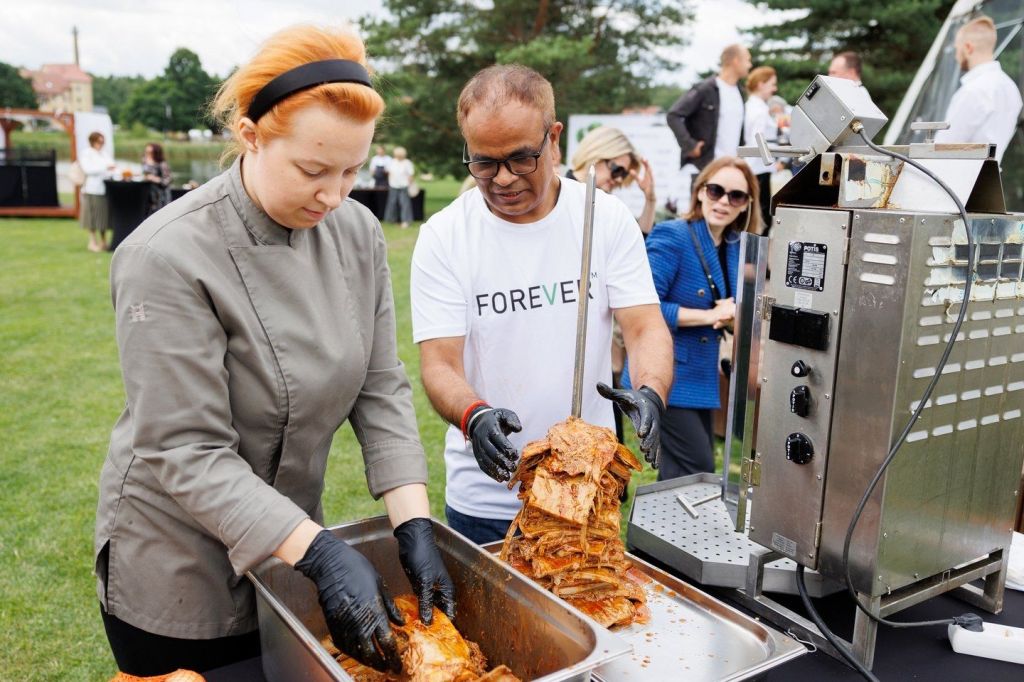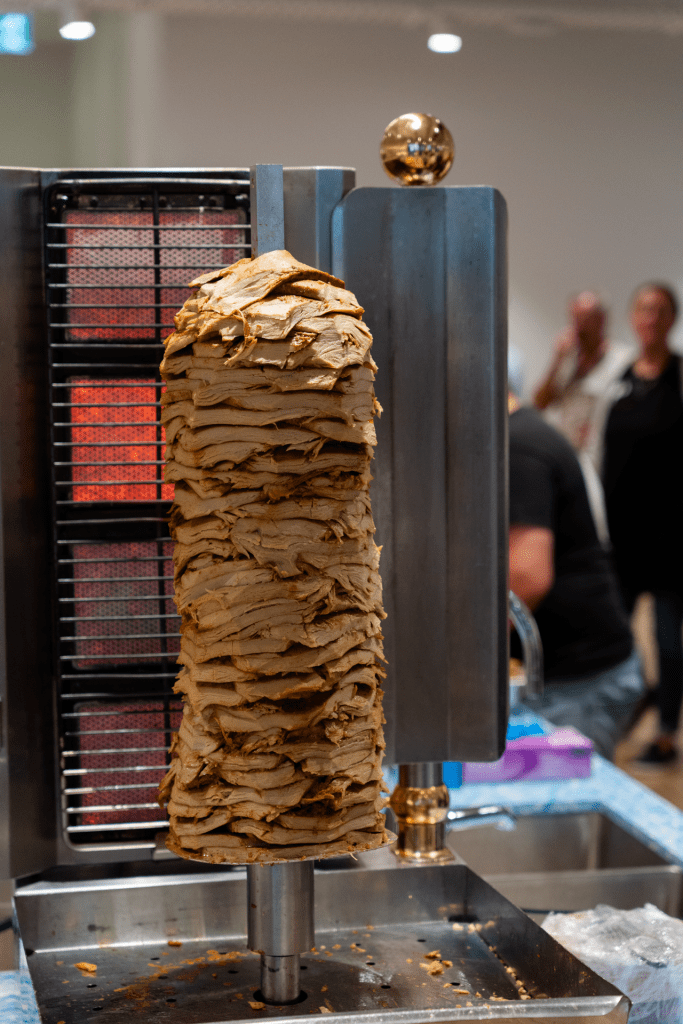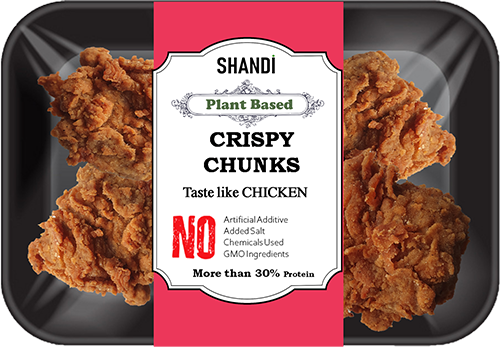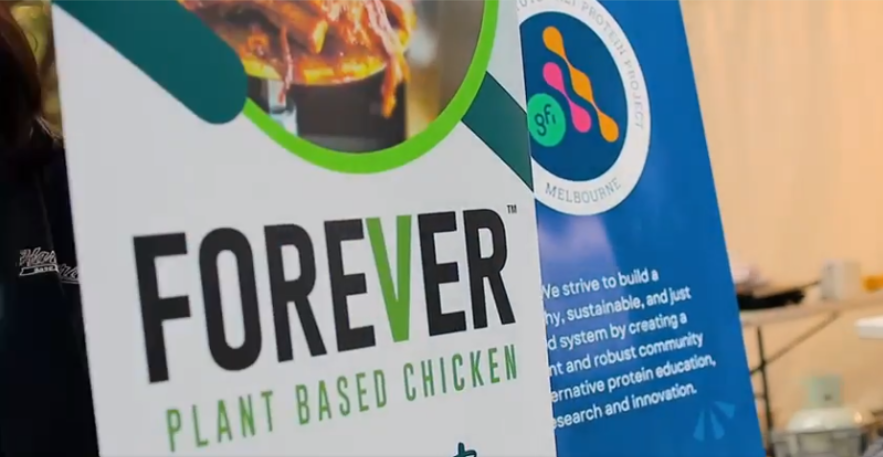Singapore-based Shandi Global claims to make the only plant-based chicken that contains more protein than conventional poultry along with the first wholecut product.
Shandi Global debuted its FOREVER brand of plant-based shawarma in Australia at a night market at University of Melbourne earlier this year, a collaboration with UMSU International and Melbourne Alternative Protein Project.
Future Alternative spoke to co-founder Dr. Gaurav Sharma and ANZ business development head Ali Farid about how they create their chicken products along with why they’ve chosen Australia as their base to launch FOREVER.
What’s the background behind Shandi’s founding?
Gaurav: Shandi started from a very personal reason. Me and my co-founder, who is my wife, are not only vegetarians, but also food scientists. And we found that vegetarian food was always difficult to find, especially when travelling. So when these plant-based meat alternatives came into the market, we were quite excited as customers.
I consume raw, plant based products as part of my everyday vegan activity. It’s not something fancy for me, it’s my everyday meal. But on the other hand, I was working in the food and ingredient industry and was part of the development of some of these plant-based alternatives at that time. And I was frustrated with it, actually. I found what we were trying to do was to reduce the nutrition, even when the purpose of food technology and science is to enhance anything, not to reduce it. We were reducing the protein. A chickpea itself has 30 plus percent protein and what we were making it into as little as 15 or 17%.

Plus, the biggest concern I had as a food scientist is that I know the purpose of going plant based is a holistic, healthier, natural diet, and we are actually adding more additives than regular processed food into the product. I was very frustrated.
So I discussed this with my wife, Reena, and she said, ‘You know the technology. Why don’t we do it better rather than get frustrated?’ And that’s where we started to develop plant-based food that needed to be better than regular vegetarian food or meat itself. That was the whole reason we started it. And then we started our innovation with the target of making it better in nutrition, better in taste, and so on.
Why did you choose chicken as your target conventional meat to replace?
Gaurav: The main reason was that chicken is the most common meal. In certain places, like Australia or the US for example, beef consumption is quite high. But if you take the rest of the world, poultry is the most consumed meat. In Asian countries like India, for example, it’s chicken everywhere. A little bit of lamb. Beef is not there at all. China is pork and chicken. Beef is not very popular there, either.
We have a very specific belief that sustainability doesn’t come by talking. If you really want to bring sustainability, it has to make a mass impact. And if you want to make that mass impact, it has to go to the masses.
I often imagined people talking in a very nice boardroom and doing a five person test and thinking they can change the world. Or putting a plant based meat into a super premium restaurant where hardly 0.1% of the population goes for dining. Do you think changing 0.1% will make any impact on sustainability? Not really. So if you want to make a measurable impact, it needs to be consumed in a measurable quantity. So that’s why we choose chicken.

The second business reason relates to the way beef is eaten, either as a pattie or a steak. And that’s why 95% of meat alternatives are a burger pattie, because it’s so easy to watch a YouTube video and you can actually make it by yourself at home. That’s not real science. It’s more culinary [education] and marketing.
Another reason for chicken was also because it’s difficult to make other meats. They have a colour, like red or reddish. Like when we make beef patties, we add a lot of flavour, we add a lot of colour, and it’s easy to make it. But chicken is so blank. It literally doesn’t have any taste by itself. So making it and making our proteins natural was our key challenge. So we said, ‘Okay, that’s why nobody’s trying to do it. We want to make a big impact, so we have to take on that challenge. We need to sort out the smell and taste and colour and texture problems.
Your website describes your plant-based chicken as having more protein than conventional chicken meat and also as the world’s first whole cut chicken product. How do you accomplish this, and what is your production process like?
It’s very simple, actually. As I said, the purpose was that it must be more nutritious than meat. Every meat consumer has a concern – they don’t eat vegetarian food because it is full of carbohydrates and very little protein, which even vegetarians know. And if we are doing the same thing, then nothing is changing.
So we determined that it must contain more protein, and the ‘how’ is very simple. All natural lentils and beans. Soy has around 30%. On a dry basis, they have more protein than meat.
If you look at the plant based products in the market, they have protein of 15 to 20% max. But chickpea already has 30% protein. So why did it go down from 30% to 20%? The simple reason is they are adding a lot of other additives to make it. And in that process, you are actually diluting the protein in nature.
What we do is we use a protein isolate, which removes the starch from the lentils, and then we keep 80% to 90% of the protein. Then we simply add around 50% water into it. And mathematically, you will get 30 plus percent protein. We don’t add anything else into it.
Typically in mock meat or plant based meat you’ll find binders because they are made with small pieces of texturized vegetable protein (TVP) and they have to soak it in water. And it takes at least 4 to 5% [of the protein] to keep it together. We don’t need that, actually. Our technology doesn’t require any binder at all.

Second is the flavour. We don’t need to add flavours because it’s developed from the protein itself.
The third area is masking. Beans have their own taste and [plant based meat producers] have to put a lot of other things in to hide it. There are two ways to go about this. If you have a [bad] smell in the room, one way is to put some air freshener in the room to make it smell nice. The second way is you clean your room so that you don’t need to hide the bad smell. That’s what we do. So instead of hiding the taste, we developed a technology which permanently eliminates the bean taste. Currently we are using chickpeas, mung beans, and fava beans, and we can make the taste as neutral as a flower without adding any additives. We call it deodorization.
Would it be fair to describe Shandi Global as an Australian brand or a Singapore brand with a foot in Australia?
Gaurav: The company is Singapore-based but the brand we are launching for the first time is registered in Australia. We don’t use the FOREVER brand in Singapore. We are only focusing on the B2B market there, for which we are still using Shandi as a brand because we don’t retail there. So FOREVER was actually born in the Australia market. You can say it’s for Australia.
Ali: We’re democratising FOREVER for everybody. So if you need it to be used in a restaurant or in B2B. We’re not ready to look into a consumer ready product yet. At the end of the day it’s the story of the chicken. It’s about having that versatility of a nutritious protein delivery system.

I’m not vegan or vegetarian like Gaurav, but it resonates with me. Like probably 99% of Australians, we have a family member that is vegan or vegetarian. Because the reality is, from a protein intake point of view, 70% is from chicken because chicken is convenient. You can find it. Chicken cooks quickly. You can put it into an air fryer quickly. You can access it. And in Australia, we love our barbecue chicken. You can jump into your supermarket or into your corner store and be able to grab a barbecue chicken. It’s a hugely versatile product.
When my brother who is vegan visits from Melbourne, we’re stressing. We don’t know what to cook, where to cook, or where to take him to a restaurant. The beauty of having a versatile product that we can use exactly the same methodology that we use to cook [conventional chicken] is a huge barrier removal for us, as I’m sure it is for most Australians.
[The Australian] market is prime and ready considering the diversity of thinking as well as the diversity of culture that we have here means that we can cater for everybody and have any of the shortcomings that plant-based alternatives have had and deliver a really nutritious product.
To stay up-to-date on the latest industry headlines, sign up to Future Alternative’s enewsletter.
Posted on:


